Essay: The Hospitality Industry's Impact in the UK
VerifiedAdded on 2023/01/06
|7
|1866
|84
Essay
AI Summary
This essay provides a comprehensive overview of the UK hospitality industry's significant role in the nation's economy. It details the industry's structure, encompassing hotels, restaurants, and tourism, and its multifaceted contributions to employment, with over 3.2 million direct and 2.8 million indirect jobs. The essay highlights the industry's substantial Gross Value Added (GVA), which nearly doubles the overall economy, and its impressive turnover. It further examines the impact of tourism, the role of the UK government's policies, and internal and external factors influencing the sector. The essay concludes by emphasizing the industry's potential for future growth, the importance of government support, and the creation of employment opportunities, offering a detailed analysis of the challenges and opportunities within the UK hospitality sector.

INDIVIDUAL ESSAY
Paraphrase This Document
Need a fresh take? Get an instant paraphrase of this document with our AI Paraphraser

Table of Contents
INTRODUCTION ..........................................................................................................................3
MAIN BODY ..................................................................................................................................3
CONCLUSION ...............................................................................................................................6
REFERENCES................................................................................................................................7
INTRODUCTION ..........................................................................................................................3
MAIN BODY ..................................................................................................................................3
CONCLUSION ...............................................................................................................................6
REFERENCES................................................................................................................................7
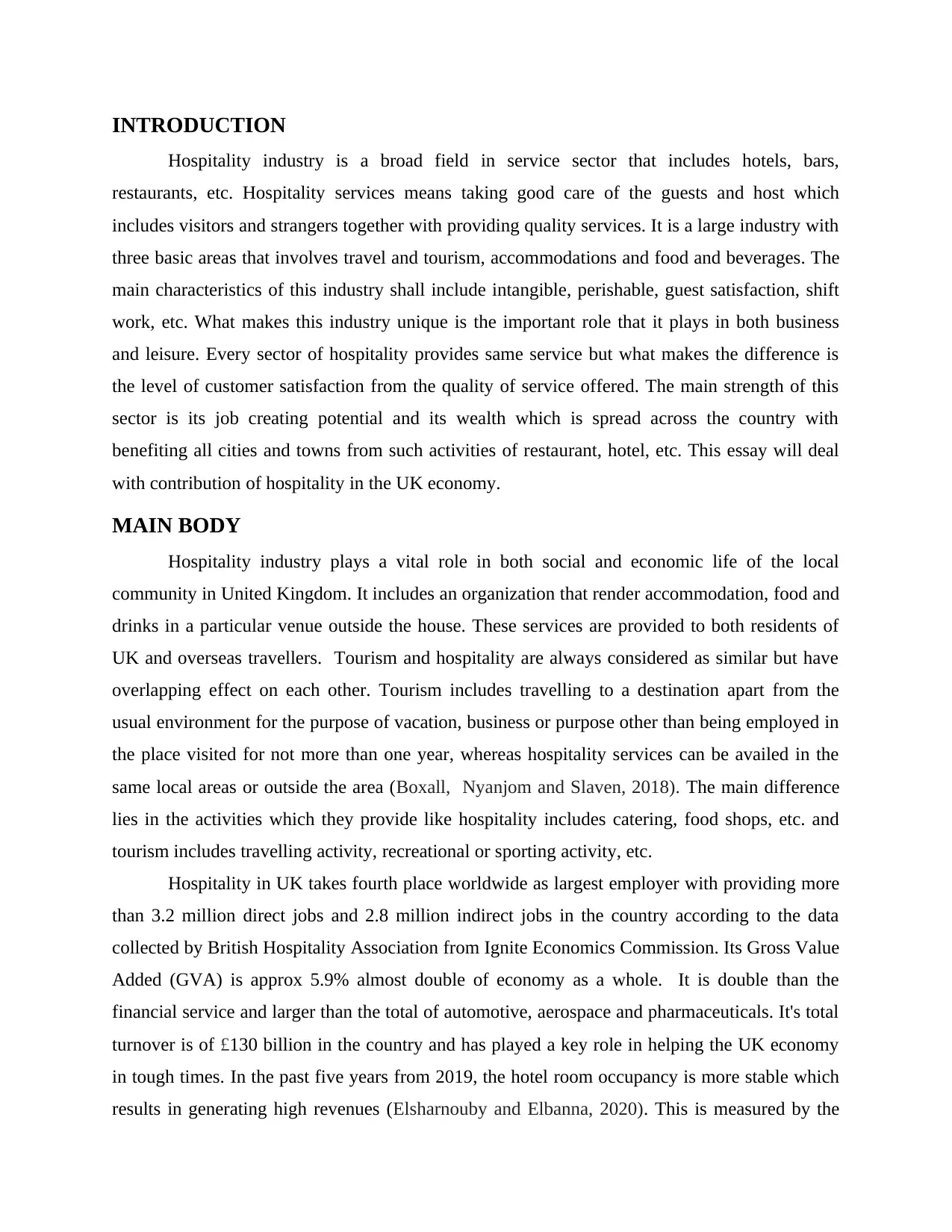
INTRODUCTION
Hospitality industry is a broad field in service sector that includes hotels, bars,
restaurants, etc. Hospitality services means taking good care of the guests and host which
includes visitors and strangers together with providing quality services. It is a large industry with
three basic areas that involves travel and tourism, accommodations and food and beverages. The
main characteristics of this industry shall include intangible, perishable, guest satisfaction, shift
work, etc. What makes this industry unique is the important role that it plays in both business
and leisure. Every sector of hospitality provides same service but what makes the difference is
the level of customer satisfaction from the quality of service offered. The main strength of this
sector is its job creating potential and its wealth which is spread across the country with
benefiting all cities and towns from such activities of restaurant, hotel, etc. This essay will deal
with contribution of hospitality in the UK economy.
MAIN BODY
Hospitality industry plays a vital role in both social and economic life of the local
community in United Kingdom. It includes an organization that render accommodation, food and
drinks in a particular venue outside the house. These services are provided to both residents of
UK and overseas travellers. Tourism and hospitality are always considered as similar but have
overlapping effect on each other. Tourism includes travelling to a destination apart from the
usual environment for the purpose of vacation, business or purpose other than being employed in
the place visited for not more than one year, whereas hospitality services can be availed in the
same local areas or outside the area (Boxall, Nyanjom and Slaven, 2018). The main difference
lies in the activities which they provide like hospitality includes catering, food shops, etc. and
tourism includes travelling activity, recreational or sporting activity, etc.
Hospitality in UK takes fourth place worldwide as largest employer with providing more
than 3.2 million direct jobs and 2.8 million indirect jobs in the country according to the data
collected by British Hospitality Association from Ignite Economics Commission. Its Gross Value
Added (GVA) is approx 5.9% almost double of economy as a whole. It is double than the
financial service and larger than the total of automotive, aerospace and pharmaceuticals. It's total
turnover is of £130 billion in the country and has played a key role in helping the UK economy
in tough times. In the past five years from 2019, the hotel room occupancy is more stable which
results in generating high revenues (Elsharnouby and Elbanna, 2020). This is measured by the
Hospitality industry is a broad field in service sector that includes hotels, bars,
restaurants, etc. Hospitality services means taking good care of the guests and host which
includes visitors and strangers together with providing quality services. It is a large industry with
three basic areas that involves travel and tourism, accommodations and food and beverages. The
main characteristics of this industry shall include intangible, perishable, guest satisfaction, shift
work, etc. What makes this industry unique is the important role that it plays in both business
and leisure. Every sector of hospitality provides same service but what makes the difference is
the level of customer satisfaction from the quality of service offered. The main strength of this
sector is its job creating potential and its wealth which is spread across the country with
benefiting all cities and towns from such activities of restaurant, hotel, etc. This essay will deal
with contribution of hospitality in the UK economy.
MAIN BODY
Hospitality industry plays a vital role in both social and economic life of the local
community in United Kingdom. It includes an organization that render accommodation, food and
drinks in a particular venue outside the house. These services are provided to both residents of
UK and overseas travellers. Tourism and hospitality are always considered as similar but have
overlapping effect on each other. Tourism includes travelling to a destination apart from the
usual environment for the purpose of vacation, business or purpose other than being employed in
the place visited for not more than one year, whereas hospitality services can be availed in the
same local areas or outside the area (Boxall, Nyanjom and Slaven, 2018). The main difference
lies in the activities which they provide like hospitality includes catering, food shops, etc. and
tourism includes travelling activity, recreational or sporting activity, etc.
Hospitality in UK takes fourth place worldwide as largest employer with providing more
than 3.2 million direct jobs and 2.8 million indirect jobs in the country according to the data
collected by British Hospitality Association from Ignite Economics Commission. Its Gross Value
Added (GVA) is approx 5.9% almost double of economy as a whole. It is double than the
financial service and larger than the total of automotive, aerospace and pharmaceuticals. It's total
turnover is of £130 billion in the country and has played a key role in helping the UK economy
in tough times. In the past five years from 2019, the hotel room occupancy is more stable which
results in generating high revenues (Elsharnouby and Elbanna, 2020). This is measured by the
⊘ This is a preview!⊘
Do you want full access?
Subscribe today to unlock all pages.

Trusted by 1+ million students worldwide
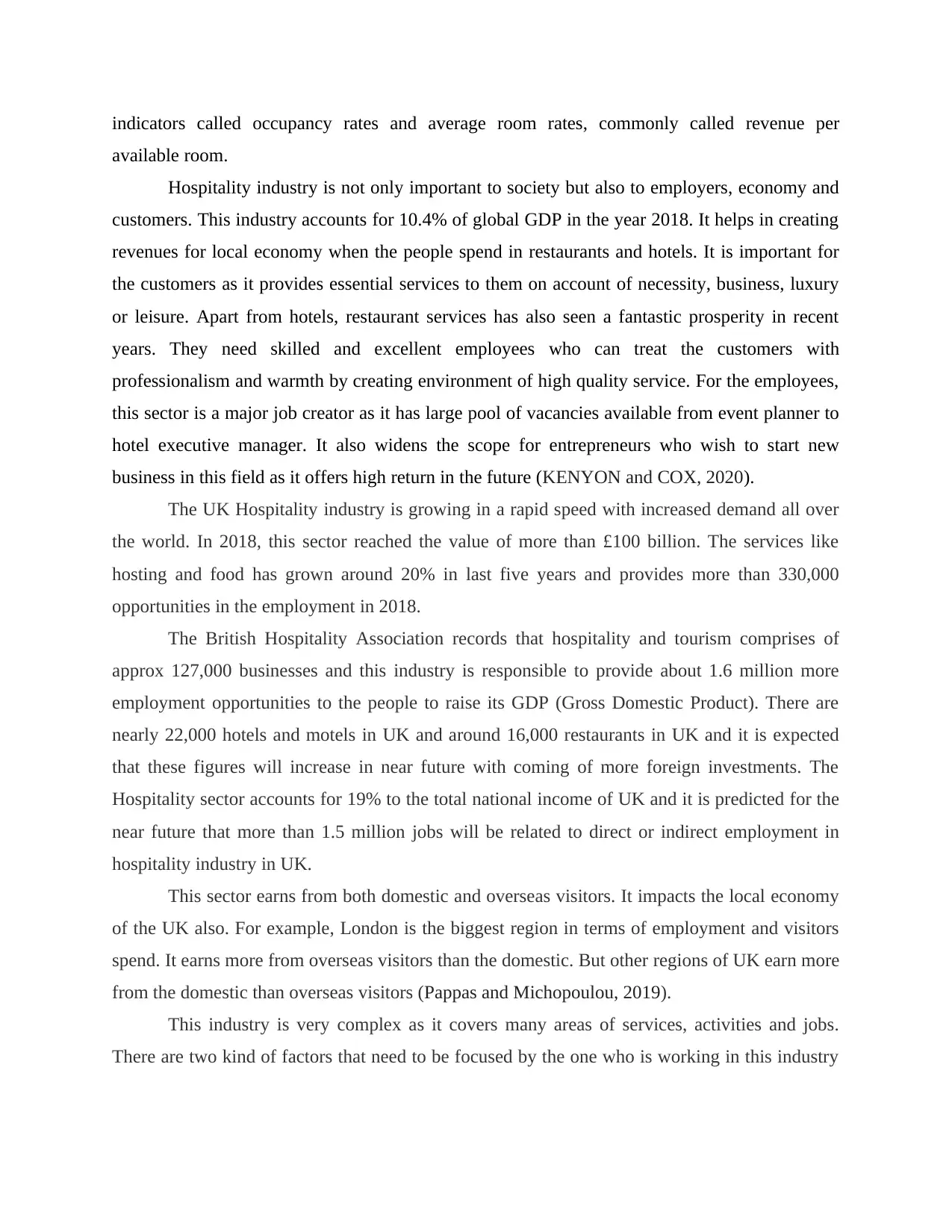
indicators called occupancy rates and average room rates, commonly called revenue per
available room.
Hospitality industry is not only important to society but also to employers, economy and
customers. This industry accounts for 10.4% of global GDP in the year 2018. It helps in creating
revenues for local economy when the people spend in restaurants and hotels. It is important for
the customers as it provides essential services to them on account of necessity, business, luxury
or leisure. Apart from hotels, restaurant services has also seen a fantastic prosperity in recent
years. They need skilled and excellent employees who can treat the customers with
professionalism and warmth by creating environment of high quality service. For the employees,
this sector is a major job creator as it has large pool of vacancies available from event planner to
hotel executive manager. It also widens the scope for entrepreneurs who wish to start new
business in this field as it offers high return in the future (KENYON and COX, 2020).
The UK Hospitality industry is growing in a rapid speed with increased demand all over
the world. In 2018, this sector reached the value of more than £100 billion. The services like
hosting and food has grown around 20% in last five years and provides more than 330,000
opportunities in the employment in 2018.
The British Hospitality Association records that hospitality and tourism comprises of
approx 127,000 businesses and this industry is responsible to provide about 1.6 million more
employment opportunities to the people to raise its GDP (Gross Domestic Product). There are
nearly 22,000 hotels and motels in UK and around 16,000 restaurants in UK and it is expected
that these figures will increase in near future with coming of more foreign investments. The
Hospitality sector accounts for 19% to the total national income of UK and it is predicted for the
near future that more than 1.5 million jobs will be related to direct or indirect employment in
hospitality industry in UK.
This sector earns from both domestic and overseas visitors. It impacts the local economy
of the UK also. For example, London is the biggest region in terms of employment and visitors
spend. It earns more from overseas visitors than the domestic. But other regions of UK earn more
from the domestic than overseas visitors (Pappas and Michopoulou, 2019).
This industry is very complex as it covers many areas of services, activities and jobs.
There are two kind of factors that need to be focused by the one who is working in this industry
available room.
Hospitality industry is not only important to society but also to employers, economy and
customers. This industry accounts for 10.4% of global GDP in the year 2018. It helps in creating
revenues for local economy when the people spend in restaurants and hotels. It is important for
the customers as it provides essential services to them on account of necessity, business, luxury
or leisure. Apart from hotels, restaurant services has also seen a fantastic prosperity in recent
years. They need skilled and excellent employees who can treat the customers with
professionalism and warmth by creating environment of high quality service. For the employees,
this sector is a major job creator as it has large pool of vacancies available from event planner to
hotel executive manager. It also widens the scope for entrepreneurs who wish to start new
business in this field as it offers high return in the future (KENYON and COX, 2020).
The UK Hospitality industry is growing in a rapid speed with increased demand all over
the world. In 2018, this sector reached the value of more than £100 billion. The services like
hosting and food has grown around 20% in last five years and provides more than 330,000
opportunities in the employment in 2018.
The British Hospitality Association records that hospitality and tourism comprises of
approx 127,000 businesses and this industry is responsible to provide about 1.6 million more
employment opportunities to the people to raise its GDP (Gross Domestic Product). There are
nearly 22,000 hotels and motels in UK and around 16,000 restaurants in UK and it is expected
that these figures will increase in near future with coming of more foreign investments. The
Hospitality sector accounts for 19% to the total national income of UK and it is predicted for the
near future that more than 1.5 million jobs will be related to direct or indirect employment in
hospitality industry in UK.
This sector earns from both domestic and overseas visitors. It impacts the local economy
of the UK also. For example, London is the biggest region in terms of employment and visitors
spend. It earns more from overseas visitors than the domestic. But other regions of UK earn more
from the domestic than overseas visitors (Pappas and Michopoulou, 2019).
This industry is very complex as it covers many areas of services, activities and jobs.
There are two kind of factors that need to be focused by the one who is working in this industry
Paraphrase This Document
Need a fresh take? Get an instant paraphrase of this document with our AI Paraphraser
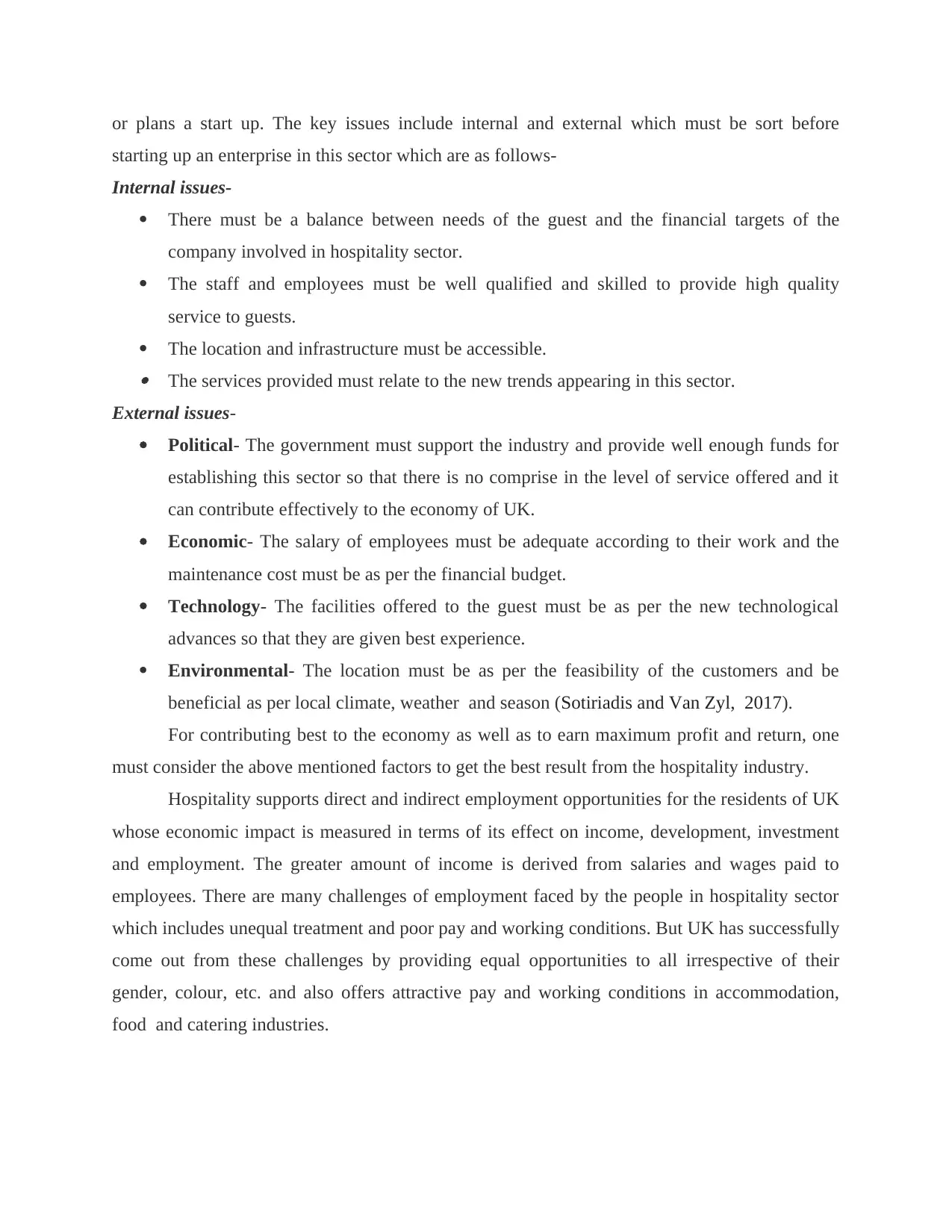
or plans a start up. The key issues include internal and external which must be sort before
starting up an enterprise in this sector which are as follows-
Internal issues-
There must be a balance between needs of the guest and the financial targets of the
company involved in hospitality sector.
The staff and employees must be well qualified and skilled to provide high quality
service to guests.
The location and infrastructure must be accessible. The services provided must relate to the new trends appearing in this sector.
External issues-
Political- The government must support the industry and provide well enough funds for
establishing this sector so that there is no comprise in the level of service offered and it
can contribute effectively to the economy of UK.
Economic- The salary of employees must be adequate according to their work and the
maintenance cost must be as per the financial budget.
Technology- The facilities offered to the guest must be as per the new technological
advances so that they are given best experience.
Environmental- The location must be as per the feasibility of the customers and be
beneficial as per local climate, weather and season (Sotiriadis and Van Zyl, 2017).
For contributing best to the economy as well as to earn maximum profit and return, one
must consider the above mentioned factors to get the best result from the hospitality industry.
Hospitality supports direct and indirect employment opportunities for the residents of UK
whose economic impact is measured in terms of its effect on income, development, investment
and employment. The greater amount of income is derived from salaries and wages paid to
employees. There are many challenges of employment faced by the people in hospitality sector
which includes unequal treatment and poor pay and working conditions. But UK has successfully
come out from these challenges by providing equal opportunities to all irrespective of their
gender, colour, etc. and also offers attractive pay and working conditions in accommodation,
food and catering industries.
starting up an enterprise in this sector which are as follows-
Internal issues-
There must be a balance between needs of the guest and the financial targets of the
company involved in hospitality sector.
The staff and employees must be well qualified and skilled to provide high quality
service to guests.
The location and infrastructure must be accessible. The services provided must relate to the new trends appearing in this sector.
External issues-
Political- The government must support the industry and provide well enough funds for
establishing this sector so that there is no comprise in the level of service offered and it
can contribute effectively to the economy of UK.
Economic- The salary of employees must be adequate according to their work and the
maintenance cost must be as per the financial budget.
Technology- The facilities offered to the guest must be as per the new technological
advances so that they are given best experience.
Environmental- The location must be as per the feasibility of the customers and be
beneficial as per local climate, weather and season (Sotiriadis and Van Zyl, 2017).
For contributing best to the economy as well as to earn maximum profit and return, one
must consider the above mentioned factors to get the best result from the hospitality industry.
Hospitality supports direct and indirect employment opportunities for the residents of UK
whose economic impact is measured in terms of its effect on income, development, investment
and employment. The greater amount of income is derived from salaries and wages paid to
employees. There are many challenges of employment faced by the people in hospitality sector
which includes unequal treatment and poor pay and working conditions. But UK has successfully
come out from these challenges by providing equal opportunities to all irrespective of their
gender, colour, etc. and also offers attractive pay and working conditions in accommodation,
food and catering industries.
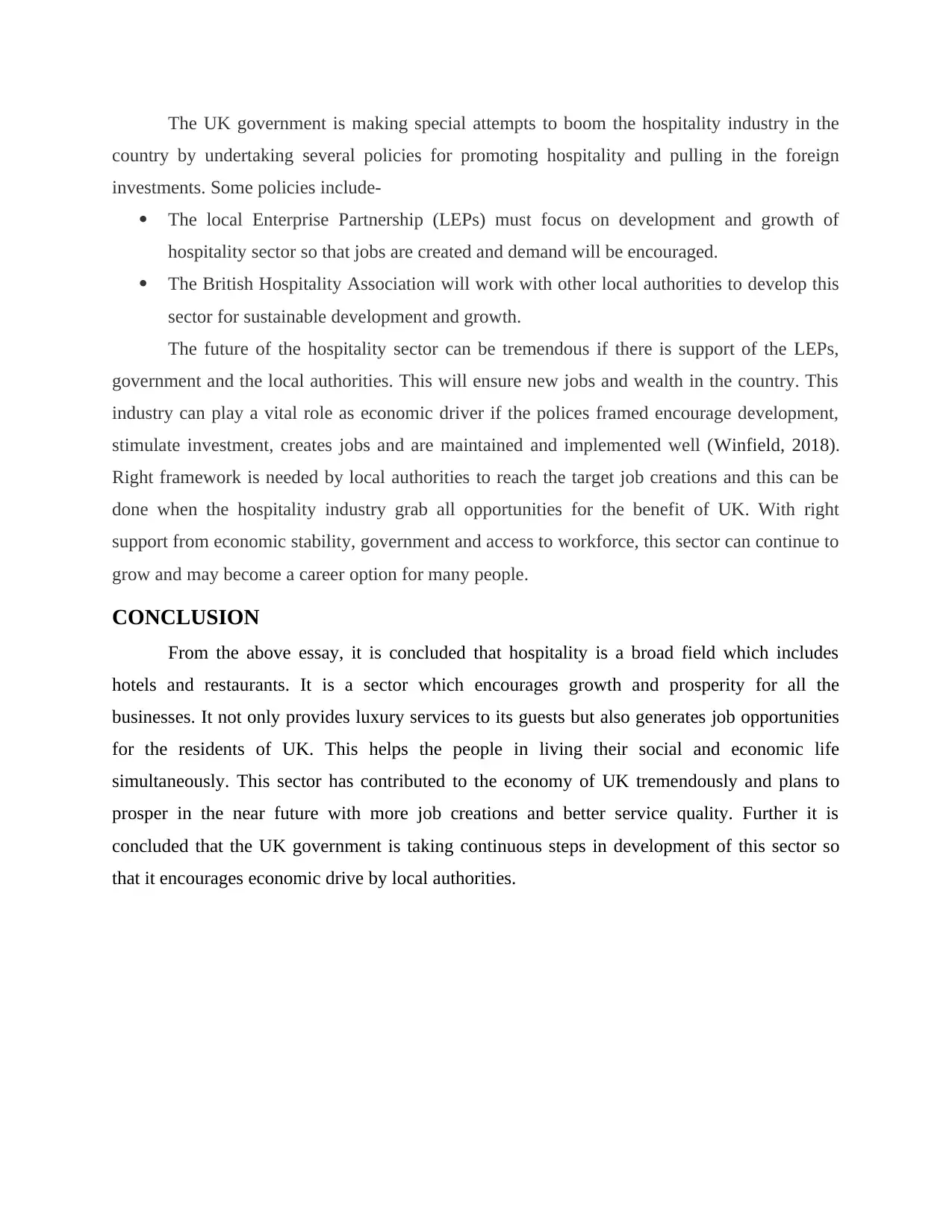
The UK government is making special attempts to boom the hospitality industry in the
country by undertaking several policies for promoting hospitality and pulling in the foreign
investments. Some policies include-
The local Enterprise Partnership (LEPs) must focus on development and growth of
hospitality sector so that jobs are created and demand will be encouraged.
The British Hospitality Association will work with other local authorities to develop this
sector for sustainable development and growth.
The future of the hospitality sector can be tremendous if there is support of the LEPs,
government and the local authorities. This will ensure new jobs and wealth in the country. This
industry can play a vital role as economic driver if the polices framed encourage development,
stimulate investment, creates jobs and are maintained and implemented well (Winfield, 2018).
Right framework is needed by local authorities to reach the target job creations and this can be
done when the hospitality industry grab all opportunities for the benefit of UK. With right
support from economic stability, government and access to workforce, this sector can continue to
grow and may become a career option for many people.
CONCLUSION
From the above essay, it is concluded that hospitality is a broad field which includes
hotels and restaurants. It is a sector which encourages growth and prosperity for all the
businesses. It not only provides luxury services to its guests but also generates job opportunities
for the residents of UK. This helps the people in living their social and economic life
simultaneously. This sector has contributed to the economy of UK tremendously and plans to
prosper in the near future with more job creations and better service quality. Further it is
concluded that the UK government is taking continuous steps in development of this sector so
that it encourages economic drive by local authorities.
country by undertaking several policies for promoting hospitality and pulling in the foreign
investments. Some policies include-
The local Enterprise Partnership (LEPs) must focus on development and growth of
hospitality sector so that jobs are created and demand will be encouraged.
The British Hospitality Association will work with other local authorities to develop this
sector for sustainable development and growth.
The future of the hospitality sector can be tremendous if there is support of the LEPs,
government and the local authorities. This will ensure new jobs and wealth in the country. This
industry can play a vital role as economic driver if the polices framed encourage development,
stimulate investment, creates jobs and are maintained and implemented well (Winfield, 2018).
Right framework is needed by local authorities to reach the target job creations and this can be
done when the hospitality industry grab all opportunities for the benefit of UK. With right
support from economic stability, government and access to workforce, this sector can continue to
grow and may become a career option for many people.
CONCLUSION
From the above essay, it is concluded that hospitality is a broad field which includes
hotels and restaurants. It is a sector which encourages growth and prosperity for all the
businesses. It not only provides luxury services to its guests but also generates job opportunities
for the residents of UK. This helps the people in living their social and economic life
simultaneously. This sector has contributed to the economy of UK tremendously and plans to
prosper in the near future with more job creations and better service quality. Further it is
concluded that the UK government is taking continuous steps in development of this sector so
that it encourages economic drive by local authorities.
⊘ This is a preview!⊘
Do you want full access?
Subscribe today to unlock all pages.

Trusted by 1+ million students worldwide
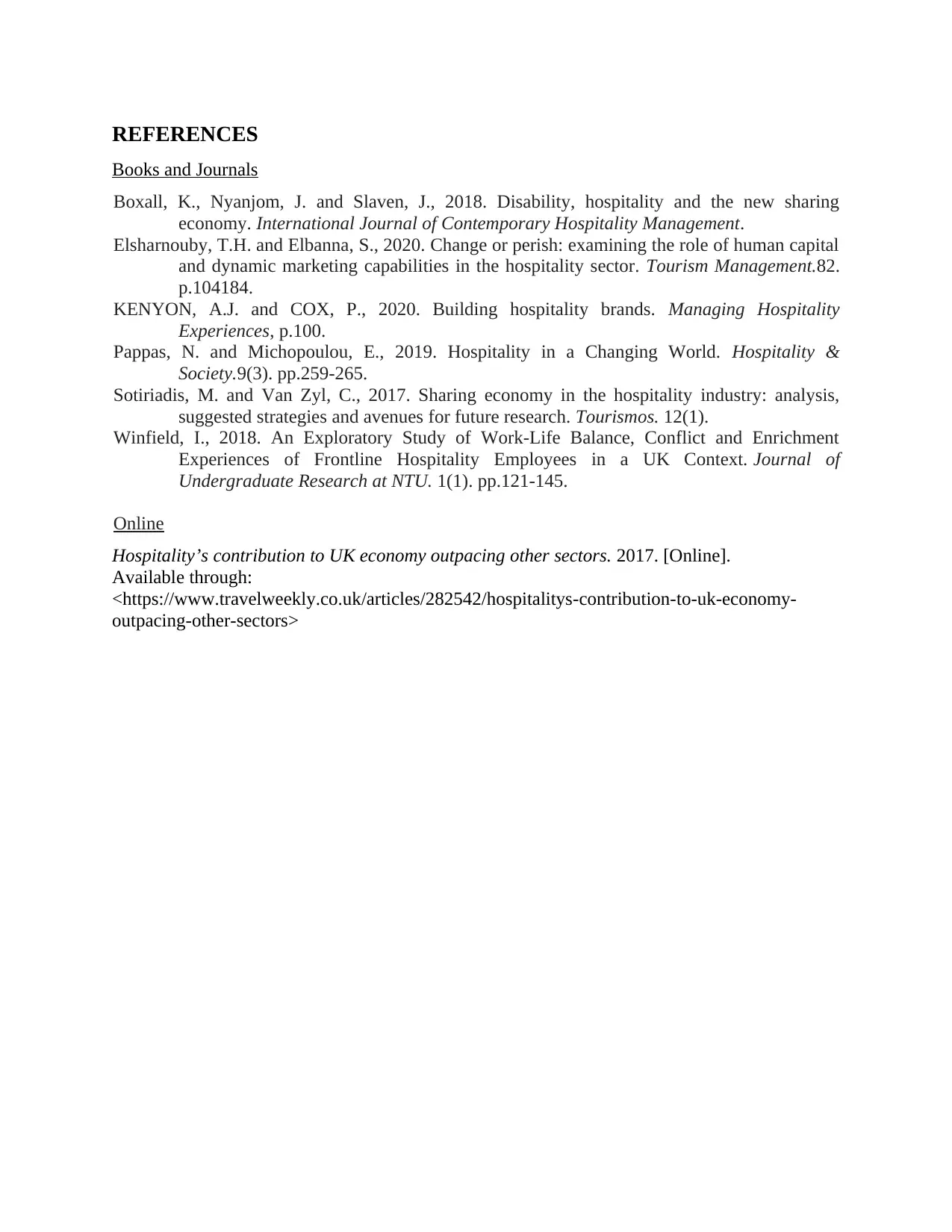
REFERENCES
Books and Journals
Boxall, K., Nyanjom, J. and Slaven, J., 2018. Disability, hospitality and the new sharing
economy. International Journal of Contemporary Hospitality Management.
Elsharnouby, T.H. and Elbanna, S., 2020. Change or perish: examining the role of human capital
and dynamic marketing capabilities in the hospitality sector. Tourism Management.82.
p.104184.
KENYON, A.J. and COX, P., 2020. Building hospitality brands. Managing Hospitality
Experiences, p.100.
Pappas, N. and Michopoulou, E., 2019. Hospitality in a Changing World. Hospitality &
Society.9(3). pp.259-265.
Sotiriadis, M. and Van Zyl, C., 2017. Sharing economy in the hospitality industry: analysis,
suggested strategies and avenues for future research. Tourismos. 12(1).
Winfield, I., 2018. An Exploratory Study of Work-Life Balance, Conflict and Enrichment
Experiences of Frontline Hospitality Employees in a UK Context. Journal of
Undergraduate Research at NTU. 1(1). pp.121-145.
Online
Hospitality’s contribution to UK economy outpacing other sectors. 2017. [Online].
Available through:
<https://www.travelweekly.co.uk/articles/282542/hospitalitys-contribution-to-uk-economy-
outpacing-other-sectors>
Books and Journals
Boxall, K., Nyanjom, J. and Slaven, J., 2018. Disability, hospitality and the new sharing
economy. International Journal of Contemporary Hospitality Management.
Elsharnouby, T.H. and Elbanna, S., 2020. Change or perish: examining the role of human capital
and dynamic marketing capabilities in the hospitality sector. Tourism Management.82.
p.104184.
KENYON, A.J. and COX, P., 2020. Building hospitality brands. Managing Hospitality
Experiences, p.100.
Pappas, N. and Michopoulou, E., 2019. Hospitality in a Changing World. Hospitality &
Society.9(3). pp.259-265.
Sotiriadis, M. and Van Zyl, C., 2017. Sharing economy in the hospitality industry: analysis,
suggested strategies and avenues for future research. Tourismos. 12(1).
Winfield, I., 2018. An Exploratory Study of Work-Life Balance, Conflict and Enrichment
Experiences of Frontline Hospitality Employees in a UK Context. Journal of
Undergraduate Research at NTU. 1(1). pp.121-145.
Online
Hospitality’s contribution to UK economy outpacing other sectors. 2017. [Online].
Available through:
<https://www.travelweekly.co.uk/articles/282542/hospitalitys-contribution-to-uk-economy-
outpacing-other-sectors>
1 out of 7
Related Documents
Your All-in-One AI-Powered Toolkit for Academic Success.
+13062052269
info@desklib.com
Available 24*7 on WhatsApp / Email
![[object Object]](/_next/static/media/star-bottom.7253800d.svg)
Unlock your academic potential
Copyright © 2020–2025 A2Z Services. All Rights Reserved. Developed and managed by ZUCOL.





